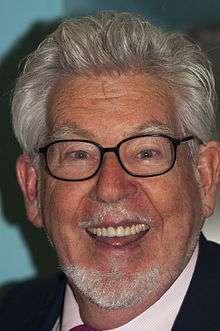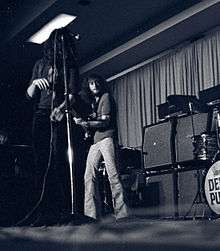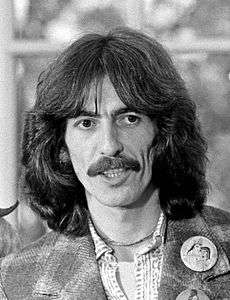List of Top Pops number-one singles

Top Pops is a former British weekly pop music newspaper. It was founded as a monthly publication by Woodrow Wyatt in May 1967, becoming fortnightly in November 1967. On 25 May 1968, editor Colin Bostock-Smith began compiling a singles sales chart using a telephone sample of approximately twelve W H Smith & Son stores – the first single to reach number one on the Top Pops chart was "Young Girl" by Gary Puckett & The Union Gap. The charts and paper were published weekly with effect from 22 June 1968.[1] On 20 September 1969 the paper was rebranded Top Pops & Music Now, and subsequently became Music Now from 21 March 1970 – at this point the chart was sampling between 30 and 40 stores. From 27 February 1971 the chart was no longer published and in May 1971 the newspaper ceased publication.[1] During the publication of the chart, 55 different singles reached number one. The only one to be knocked off number one and then regain the top spot was "Mony Mony" by Tommy James and the Shondells. The final chart-topper was "My Sweet Lord" by George Harrison.
From the advent of charts in the UK until 1969 several magazines and newspapers published their own charts, and there was no one "official" singles chart.[2][3] In February 1969, however, Record Retailer and the BBC jointly commissioned the British Market Research Bureau (BMRB) to compile an official chart.[2][4] The Record Retailer chart is now considered by the Official Charts Company, the current compilers of the UK Singles Chart, to be the canonical source for number-one singles for the earlier part of the 1960s.[4] Charts compiled by Top Pops had fifteen number-one singles that did not reach the top spot in the Record Retailer chart; in comparison, a total of nine Top Pops number-ones did not top the rival New Musical Express chart.[5] Seven Top Pops number ones did not top either of the other publications' charts. Edwin Hawkins Singers' "Oh Happy Day", Robin Gibb's "Saved by the Bell", Bee Gees' "Don't Forget to Remember", and The Tremeloes' "(Call Me) Number One" all peaked at number two in both charts, Herman's Hermits' "My Sentimental Friend" and Don Fardon's "Indian Reservation" placed with one number two and one number three in each chart, and Stevie Wonder's "My Cherie Amour" reached fourth and third spot in the two charts.[6][7][8][9][10][11][12][13]
Number-one singles



| No. | nth single to top the chart |
|---|---|
| re | Return of a single to number one |
| The song did not reach number one on the chart that is now considered official by the Official Charts Company.[14][15][16][17] |
| Contents |
|---|
| 1968 • 1969 • 1970 • 1971 |
| No. | Artist[nb 1] | Single[nb 1] | Reached number one[nb 1] | Weeks at number one[nb 1] | |
|---|---|---|---|---|---|
| 1968 | |||||
| 1 | Gary Puckett & The Union Gap | "Young Girl" | 25 May 1968 | 4[nb 2] | |
| 2 | Rolling Stones, TheThe Rolling Stones | "Jumpin' Jack Flash" | 22 June 1968 | 3 | |
| 3 | Equals, TheThe Equals | "Baby Come Back" | 13 July 1968 | 2 | |
| 4 | Tommy James and the Shondells | "Mony Mony" | 27 July 1968 | 2 | |
| 5 | Crazy World of Arthur Brown | "Fire" | 10 August 1968 | 1 | |
| re | Tommy James and the Shondells | "Mony Mony" | 17 August 1968 | 2 | |
| 6 | Bee Gees | "I've Gotta Get a Message to You" | 31 August 1968 | 1 | |
| 7 | Beatles, TheThe Beatles | "Hey Jude" | 7 September 1968 | 4 | |
| 8 | Hopkin, MaryMary Hopkin | "Those Were the Days" | 5 October 1968 | 5 | |
| 9 | Cocker, JoeJoe Cocker | "With a Little Help from My Friends" | 9 November 1968 | 2 | |
| 10 | Montenegro, HugoHugo Montenegro | "The Good, the Bad and the Ugly" | 23 November 1968 | 2 | |
| 11 | Scaffold, TheThe Scaffold | "Lily the Pink" | 7 December 1968 | 5 | |
| 1969 | |||||
| 12 | Marmalade | "Ob-La-Di, Ob-La-Da" | 11 January 1969 | 2 | |
| 13 | Fleetwood Mac | "Albatross" | 25 January 1969 | 4 | |
| 14 | Amen Corner | "(If Paradise) Is Half as Nice" | 22 February 1969 | 2 | |
| 15 | Sarstedt, PeterPeter Sarstedt | "Where Do You Go To (My Lovely)?" | 8 March 1969 | 2 | |
| 16 | Gaye, MarvinMarvin Gaye | "I Heard It Through the Grapevine" | 22 March 1969 | 4 | |
| 17 | Dekker, DesmondDesmond Dekker & The Aces | "Israelites" | 19 April 1969 | 1 | |
| 18 | Beatles, TheThe Beatles with Billy Preston | "Get Back" | 26 April 1969 | 3 | |
| 19 | Herman's Hermits | "My Sentimental Friend" |
24 May 1969 | 2 | |
| 20 | Roe, TommyTommy Roe | "Dizzy" | 7 June 1969 | 2 | |
| 21 | Beatles, TheThe Beatles | "The Ballad of John and Yoko" | 21 June 1969 | 2 | |
| 22 | Hawkins, EdwinEdwin Hawkins Singers | "Oh Happy Day" |
5 July 1969 | 1 | |
| 23 | Presley, ElvisElvis Presley | "In the Ghetto" |
12 July 1969 | 1 | |
| 24 | Thunderclap Newman | "Something in the Air" | 19 July 1969 | 1 | |
| 25 | Rolling Stones, TheThe Rolling Stones | "Honky Tonk Women" | 26 July 1969 | 2 | |
| 26 | Gibb, RobinRobin Gibb | "Saved by the Bell" |
9 August 1969 | 2 | |
| 27 | Wonder, StevieStevie Wonder | "My Cherie Amour" |
23 August 1969 | 1 | |
| 28 | Zager and Evans | "In The Year 2525 (Exordium and Terminus)" | 30 August 1969 | 4 | |
| 29 | Bee Gees | "Don't Forget to Remember" |
27 September 1969 | 1 | |
| 30 | Gentry, BobbieBobbie Gentry | "I'll Never Fall in Love Again" | 4 October 1969 | 2 | |
| 31 | Birkin, JaneJane Birkin and Serge Gainsbourg | "Je t'aime... moi non plus" | 18 October 1969 | 2 | |
| 32 | Archies, TheThe Archies | "Sugar, Sugar" | 1 November 1969 | 2 | |
| 33 | Fleetwood Mac | "Oh Well" |
15 November 1969 | 2 | |
| 34 | Tremeloes, TheThe Tremeloes | "(Call Me) Number One" |
29 November 1969 | 2 | |
| 35 | Rogers, KennyKenny Rogers and The First Edition | "Ruby, Don't Take Your Love to Town" |
13 December 1969 | 1 | |
| 36 | Harris, RolfRolf Harris | "Two Little Boys" | 20 December 1969 | 6 | |
| 1970 | |||||
| 37 | Marmalade | "Reflections of My Life" |
31 January 1970 | 1 | |
| 38 | Lighthouse, EdisonEdison Lighthouse | "Love Grows (Where My Rosemary Goes)" | 7 February 1970 | 3 | |
| 39 | Jackson 5, TheThe Jackson 5 | "I Want You Back" |
28 February 1970 | 3 | |
| 40 | Simon & Garfunkel | "Bridge over Troubled Water" | 21 March 1970 | 5 | |
| 41 | Greenbaum, NormanNorman Greenbaum | "Spirit in the Sky" | 25 April 1970 | 4 | |
| 42 | England World Cup Squad "70" | "Back Home" | 23 May 1970 | 1 | |
| 43 | Christie | "Yellow River" | 30 May 1970 | 1 | |
| 44 | Jerry, MungoMungo Jerry | "In the Summertime" | 13 June 1970 | 4 | |
| 45 | Free | "All Right Now" |
11 July 1970 | 4 | |
| 46 | Presley, ElvisElvis Presley | "The Wonder of You" | 1 August 1970 | 3 | |
| 47 | Robinson, SmokeySmokey Robinson and The Miracles | "The Tears of a Clown" | 29 August 1970 | 4 | |
| 48 | Payne, FredaFreda Payne | "Band of Gold" | 26 September 1970 | 5 | |
| 49 | Deep Purple | "Black Night" |
31 October 1970 | 1 | |
| 50 | Matthews' Southern Comfort | "Woodstock" | 7 November 1970 | 3 | |
| 51 | Fardon, DonDon Fardon | "Indian Reservation" |
28 November 1970 | 1 | |
| 52 | Edmunds, DaveDave Edmunds's Rockpile | "I Hear You Knocking" | 5 December 1970 | 2 | |
| 53 | McGuinness Flint | "When I'm Dead and Gone" |
19 December 1970 | 3 | |
| 1971 | |||||
| 54 | Dunn, CliveClive Dunn | "Grandad" | 9 January 1971 | 3 | |
| 55 | Harrison, GeorgeGeorge Harrison | "My Sweet Lord" | 30 January 1971 | 4 | |
Notes
References
- Footnotes
- 1 2 3 Smith, Alan. "Every No.1 in the 1960s is listed from all the nine different magazine charts!". davemcaleer.com. Archived from the original on 10 May 2011. Retrieved 4 November 2010.
- 1 2 Smith, Alan. "50s & 60s UK Charts – The Truth!". davemcaleer.com. Retrieved 4 November 2010.
- ↑ Leigh, Spencer (20 February 1998). "Music: Charting the number ones that somehow got away". The Independent. Retrieved 5 August 2010.
- 1 2 "Key Dates in the History of the Official UK Charts". Official Charts Company. Archived from the original on 10 January 2008. Retrieved 16 May 2010.
- ↑ Rees, Lazell & Osborne 1995, pp. 195–232.
- ↑ Rees, Lazell & Osborne 1995, pp. 208, 210–211, 213, 215, 228.
- ↑ "Artist Chart History: Robin Gibb". Official Charts Company. Retrieved 9 October 2010.
- ↑ "Artist Chart History: Edwin Hawkins Singers featuring Dorothy Combs Morrison". Official Charts Company. Retrieved 9 October 2010.
- ↑ "Artist Chart History: Bee Gees". Official Charts Company. Retrieved 9 October 2010.
- ↑ "Artist Chart History: Tremeloes". Official Charts Company. Retrieved 9 October 2010.
- ↑ "Artist Chart History: Herman's Hermits". Official Charts Company. Retrieved 9 October 2010.
- ↑ "Artist Chart History: Don Fardon". Official Charts Company. Retrieved 9 October 2010.
- ↑ "Artist Chart History: Stevie Wonder". Official Charts Company. Retrieved 9 October 2010.
- ↑ "All the Number One Singles: 1968". Official Charts Company. Retrieved 28 July 2012.
- ↑ "All the Number One Singles: 1969". Official Charts Company. Retrieved 13 June 2010.
- ↑ "All the Number One Singles: 1970". Official Charts Company. Retrieved 13 June 2010.
- ↑ "All the Number One Singles: 1971". Official Charts Company. Retrieved 13 June 2010.
- Sources
- Rees, Dafydd; Lazell, Barry; Osborne, Roger (1995). Forty Years of "NME" Charts (2nd ed.). Pan Macmillan. ISBN 978-0-7522-0829-9.